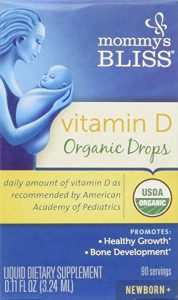![Best Vitamin D Drops For Babies And Infants [TESTED Nov. 2023]](https://www.wellnessgeeky.com/wp-content/uploads/2017/09/d-drops.jpg)
The American Academy of Pediatrics Recommends that NEWBORNS, until a Year Old, Receive a Daily Vitamin D Supplement. In 2003, the Recommended Dosage was 200 International Units (IU) per day. In 2008, that amount doubled to 400 IU a day.
This increase was based on a study published in "Pediatrics" showing infants being breastfed, fed a combination of breast milk and formula, or consuming a diet of one hundred percent formula, were not receiving adequate amounts of vitamin D.
As with most things in life, when it comes to supplements, there are more options than there are hours in the day to do the research.
Some products can even be dangerous.
One of the products that been recommended to me by a friend and have been recommended by many people online (Here it is - Do Not Buy) caused by the baby having severe Vomiting, Acid Reflux and she become really fussy.
So, here are a few recommendations and information about how to choose the best brand & product.
>>Skip To Check the Top Vitamin Choices Below<<
This vitamin is necessary for proper and adequate absorption of phosphorus and calcium, both of which are needed for building strong bones.
Without the proper amount of absorbed calcium, breastfed babies run the risk of acquiring rickets, which weakens and softens bones.
Once you've selected the one that's right for you, no matter what your own preferred requirements, there is one important factor to consider, which is the FDA warning regarding the dangers of overdose.
Make sure you administer no more than the recommended 400 IU a day. It's also a good idea to use only the dropper that comes with the supplement and keep the packaging materials. That way, anyone caring for your baby has all the information they need.
Top Rated / Best Vitamin D Drops For Babies
Organic Options
1. Mommy's Bliss Organic Drops
If you are looking for the best organic vitamin D drops for infants, Mommy's Bliss is an excellent choice.
They are 100% USDA-certified organic, and a single drop delivers the daily recommended dosage, so there's little danger of overdose.
There are no artificial colors or flavors, they're gluten and soy-free, and they contain no chemicals or additives.
.
2. ChildLife Organic Vitamin D3 Drops
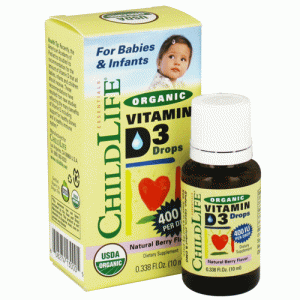
However, one caveat on this recommendation is the fact that they are only 95% organic.
One drop contains the full day's recommended dosage, so they're also easy to administer. But if for you, it's 100% certified organic or nothing, we recommend going with Mommy's Bliss.
.
All natural Options
If you do not insist on going strictly organic, but still want the best natural drops available, you're in luck.
There are several trustworthy brands available, many of which are approved and recommended by the American Academy of Pediatrics (AAP).
3. Carlson Labs Baby Natural
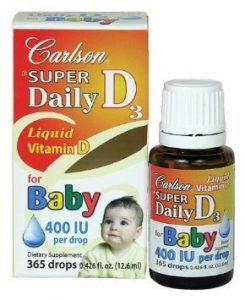
A common reason many love this brand is the fact that they are tasteless and colorless.
Most nursing mothers find it easiest to just administer a drop while breastfeeding, but those who feed their babies either a partial or all formula diet, particularly like this option for how easy it is to mix into the formula.
.
4. Zoomavit Vitamin D3 Drops
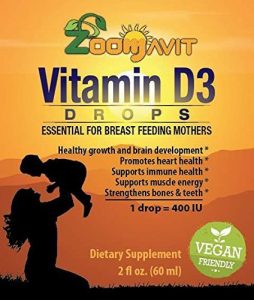
Mothers who are taking high doses for themselves in order to pass the vitamin onto their babies through breastfeeding enjoy the mild citrus taste.
Others find it completely tasteless, and therefore like this brand as opposed to others that have strong flavors.
These drops also mix easily and instantly into any drink.
.
Baby Ddrops 400IU Vitamin D
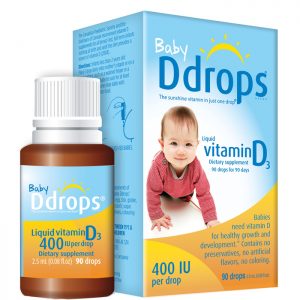
What makes them so highly preferred, more so than others, is the short ingredients list: baby vitamin D and coconut oil. That's it. They contain no chemicals or artificial flavors or colors.
They don’t have any of the additives that are so often the cause of allergies, which is a big relief since the only way mothers discover allergies is by going through the unknown minefield of the first few years.
Baby D drops reviews consistently echo the positive experience with the brand, and most reviewers are repeat customers.
Mothers who love Baby Ddrops insist on them solely for their lack of unnecessary fillers and chemicals.
.
VitaDaily Vitamin D
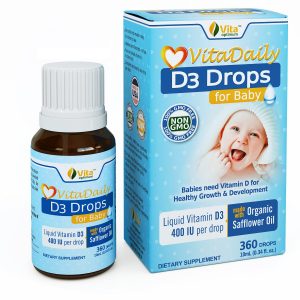
Like many of the others, they're also tasteless and can be mixed easily into any liquid you like.
There are no additives or preservatives in this brand of vitamin d drops, they’re GMO-free, and they contain one hundred percent organic safflower oil.
.
Zarbee's Vitamin D Drops
According to Zarbee's website, the company's drops work "at a cellular level to boost bone health and strengthen your immune system," which is exactly what a dull winter needs. I don't know about you, but my bones could use a good helping of vitamin D food. The non-toxic formula also contains apple cider vinegar, which should help you get your daily dose of the immune-boosting fruit, and liquid vitamin E for added protection against "environmental factors like pollen, mold, and air pollution." My skin-care routine is pretty minimal, but I already swear by the following moisturizers: moisturizer, lotion, and serum. As long as you've got these three going, your body and your makeup will be good to go, as far as I'm concerned.
Alternatives to Baby D Rops
If you're looking for an alternative to vitamin d drops to giving your infant drops, there are a couple of options.
There are several reasons that some mothers, especially those who are breastfeeding only, prefer not to give their babies drops of any sort, regardless of vitamin or supplemental requirements or recommendations.
These moms typically report that they want their newborns to ingest only natural breast milk and nothing else.
So instead of giving their infants a supplement, they choose other ways of increasing the amount of the vitamin their babies receive naturally.
Some methods include increasing the time they and their newborns spend in the sun and taking higher doses of the vitamin themselves (whether through diet, over-the-counter supplements, or a combination of both).
The Centers for Disease Control recommends against this approach, mainly due to the dangers of skin cancer associated with over-exposure to the sun.
Additionally, most mothers are unable to take high enough doses consistently to ensure their babies are getting the required amount.
If you are going this route, however, it is advised that you take at least ten times the recommended daily dose.
This can mean up to 6,000 IU of vitamin d per day. You should also eat a diet high in vitamin D.
This means a lot of fish (including canned fish like sardines and herring), oysters and shrimp, orange juice, milk (soy or cow), oatmeal and fortified cereals, mushrooms, and eggs (the yolks in particular).
Hope you like our buyers guide and are now ready to buy the right type of vitamin d drops for your baby.
.
Frequently Asked Questions
Do Newborns Really Need Vitamin D Drops?
Yes, newborns do indeed need vitamin D drops. Vitamin D (by Nordic Naturals Baby's Vitamin with extra virgin olive oil formula) is crucial for proper growth and development, as it plays a vital role in bone health and the regulation of calcium and phosphorus levels in the body. Newborns, especially those who are exclusively breastfed, are at an increased risk of vitamin D deficiency due to limited dietary sources. Breast milk is generally low in vitamin D, and sunlight exposure alone may not be sufficient to meet the newborn's requirements.
Therefore, it is recommended that breastfed infants receive a daily vitamin D supplement in the form of drops, typically 400 IU (International Units) per day, starting from birth and continuing throughout infancy. This ensures that newborns receive an adequate amount of vitamin D to support their overall health and bone development. It is important to consult with a healthcare professional for specific dosage recommendations and to address any individual concerns.
Which Vitamin is Absent in Breast Milk?
Vitamin K is absent in breast milk. Breast milk is an incredible source of nutrition for infants, providing a wide range of essential nutrients. However, one notable exception is vitamin K. Although breast milk is rich in other vitamins, minerals, and fats crucial for a baby's growth and development, it does not contain adequate levels of vitamin K. Vitamin K is important for blood clotting and bone metabolism.
To compensate for this, shortly after birth, infants are typically given a vitamin K injection to ensure they have enough of this vital nutrient. This injection helps prevent a rare but serious condition called vitamin K deficiency bleeding, which can occur in newborns due to low levels of vitamin K in their bodies.
How to Use Vitamin D Drops for Baby?
Using vitamin D drops for a baby is essential to support their growth and development, particularly for bone health. Infants, especially those who are exclusively breastfed, may not receive sufficient vitamin D from their diet alone. Vitamin D drops are designed to bridge this gap and ensure that your baby receives the recommended daily intake of this vital nutrient. Here's a detailed guide on how to use vitamin D drops for your baby:
- Consult a Pediatrician: Before starting any supplements, consult your pediatrician. They can provide guidance on the appropriate dosage and brand of vitamin D drops for your baby based on their specific needs and age.
- Choose the Right Product: Select a vitamin D supplement that is specifically formulated for infants. These drops typically contain vitamin D3 (cholecalciferol), which is the most effective form of vitamin D.
- Read the Label: Carefully read the product label and instructions. It will provide valuable information on the recommended dosage, storage conditions, and any additional usage tips.
- Administer the Drops: Most vitamin D drops for babies are administered orally. Use the dropper that comes with the product to measure the correct dosage. Ensure that the dropper is clean and sterilized before use.
- Dosage: The recommended dosage may vary depending on your baby's age and the specific product. However, a common dosage is usually around 400 international units (IU) per day for infants. Administer the drops directly into your baby's mouth, preferably at the same time each day.
- Timing: It's often recommended to give the drops during a feeding to minimize the risk of spitting them out. You can put the drops on your nipple, a pacifier, or a clean finger and let your baby suck them during a feed.
- Avoid Mixing with Food or Drink: Do not mix vitamin D drops with formula, breast milk, or any other liquid or food. Administer them directly to ensure your baby receives the full dosage.
- Consistency is Key: Make giving vitamin D drops a daily routine to ensure your baby gets a consistent supply of this important nutrient.
- Storage: Store the drops as per the product's instructions, typically in a cool, dark place. Check the expiration date to ensure the drops remain effective.
- Monitor Your Baby's Health: Keep an eye on your baby's health and development, and report any concerns to your pediatrician. They may adjust the dosage if necessary.
Vitamin D is crucial for the growth and overall health of your baby. By following these guidelines and consulting with your pediatrician, you can ensure that your infant receives the right amount of vitamin D to support their well-being. Always prioritize the health and safety of your baby when using supplements, and seek professional advice when in doubt.
